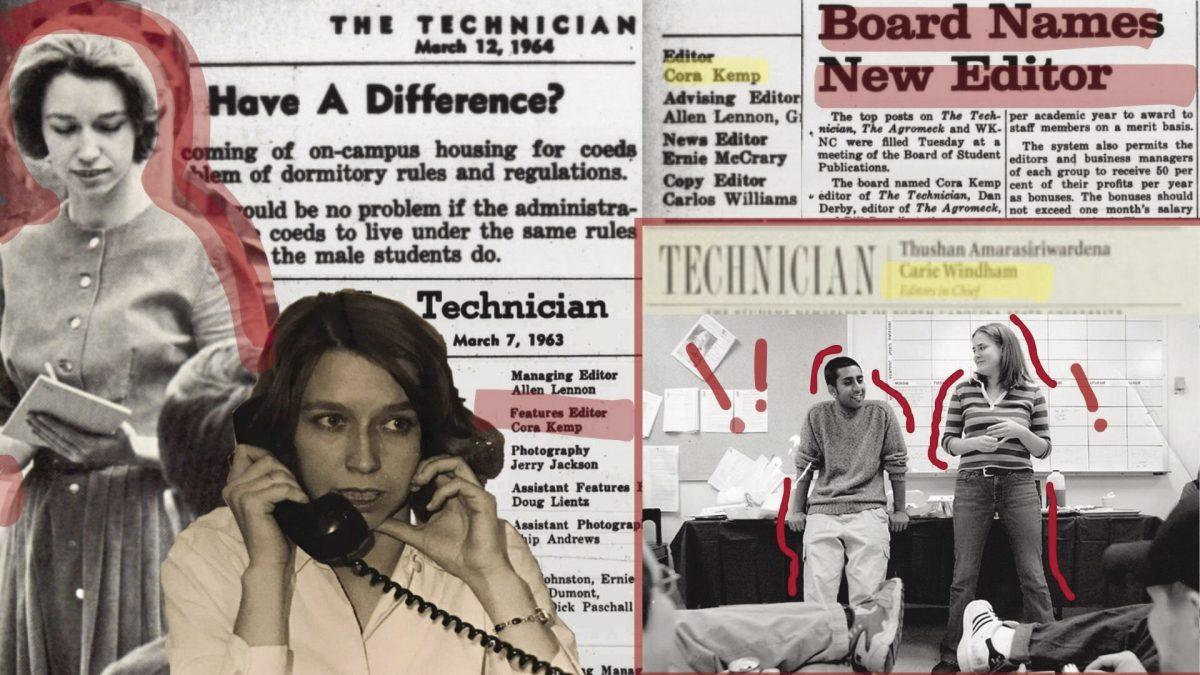Upon its founding in 1920, Technician’s editorial board consisted solely of men. This pattern continued for over four decades — until Cora Kemp came along.
In 1964, Kemp became the first female editor-in-chief of Technician’s Vol. 49.
Her journey on the editorial staff, however, goes back to 1961, when she became assistant news editor as a first-year student. In 1962, two years before taking the position of editor-in-chief, she also served as features editor.
“The one thing I did know about Cora and learned about it from her husband was that she didn’t have big, big dreams when she came to NC State,” said Tim Peeler, a public communications specialist at University Communications. “Coming to NC State, specifically working at Technician, really opened up her opportunities, and that’s what NC State has done to many people through the years.”
Peeler said Kemp was someone who took advantage of opportunities and reached for bigger dreams.
“Cora was not just the Technician editor, she was an activist on campus,” Peeler said. “She helped get things changed, specifically with the integration of the restaurants on Hillsborough Street, and she maintained that same kind of tenacity — that’s a really good word for her. They called her ‘Cora the Cobra.’ She made a difference.”
And Kemp did make a difference on campus, using journalism as her main outlet of activism.
The same year she was named editor-in-chief, the opening of the first coed dormitory on campus was announced. Many discussions took place regarding the issue, and Kemp was at the forefront of it.
In an editorial published on March 12, 1964, titled “Why Have A Difference,” Kemp wrote on rules and regulations the University was imposing on women.
“Actually, there would be no problem if the administration would allow the coeds to live under the same rules and regulations that the male students do,” Kemp wrote. “Women have traditionally led a sheltered life wherever privileges are concerned. But sometimes traditions are warped and outdated. … We think women are just as mature as the male students and should be subject to the same rules and privileges. We would like to see them on equal footing as far as housing is concerned.”
Kemp advocated for liberal policy regarding housing. Her words made an impact and helped move campus toward gender equality during her time at Technician.
Forty volumes and almost four decades later, Carie Page, former Technician editor-in-chief of Vol. 85, walked inside of Technician’s newsroom the day after 9/11. She was a freshman with the intention of becoming part of the staff and doing something bigger than herself.
Page said she remembers entering the newsroom and seeing a lot of people working, but not all of them were men — in fact, it was a female news editor that took Page under her wing.
“I walked in that first day, and I saw an amazing woman who said, ‘Hey, I’m doing this, you can do this. Let me show you how,’” Page said. “I think in order to create a system where you bring diverse voices in, they have to be there so that people feel that sense of belonging. … I was really lucky that I had that. … If I had walked into Technician that first day and only seen men in the newsroom, I might have had a different inclination.”
At the end of her sophomore year, she was offered the role of editor-in-chief alongside her future co-editor, Thushan Amarasiriwardena.
During her time at Technician, Page spent a lot of time revisiting its archives. When she became editor-in-chief, she went through a deep dive to know what women were in the position before her.
“I think it is always reassuring to know that someone has already broken the barrier, right?” Page said.
Page found that before her there were only three female editors including Kemp.
“I have to say, … I’m realizing now like, I don’t know that I really at the time grasped how few females there had been until I’m looking at this list,” Page said. “I knew there had been some before, so I knew I wasn’t going to be the first. I don’t think I realized that it was a little bit, it was still a little bit of an aberration. That’s crazy. I’m glad it’s not the case anymore.”
Both Kemp and Page’s legacy are still felt within and outside of the walls of Technician’s newsroom. Their passion for journalism and activism on campus is remembered and carried within every woman that makes up Student Media today.








